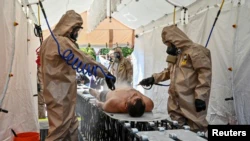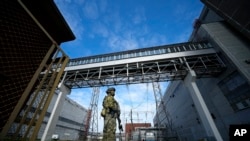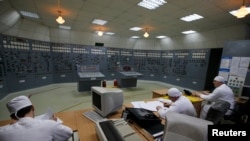An engineer working under Russian occupation since March 4 at Ukraine’s Zaporizhzhia nuclear power plant (ZNPP) has told VOA that Russian forces have placed artillery and missile installations within and around the property of the plant and have themselves caused explosions near the plant in an apparent attempt to discredit the Ukrainian military.
The account of the engineer, whose identity is being withheld for fear of retaliation by the occupying authorities, supports Ukrainian government claims that Russia itself is responsible for the explosions in the area of Europe’s largest nuclear power plant. Russian officials have repeatedly said the explosions are the result of Ukrainian rocket and artillery fire.
Negotiations have been under way for inspectors from the International Atomic Energy Agency (IAEA) to gain access to the site to determine the risk of a catastrophic accident. IAEA Director General Rafael Mariano Grossi said this week that he hopes to conclude negotiations with the two countries on details of an inspection visit soon.
The interview with the engineer, a longtime resident of the city of Enerhodar, where the plant is located, took place before Ukraine’s state company, Energoatom, announced Thursday that fires at a nearby coal-fired plant had cut off the last connection line between the plant and the Ukrainian power grid. The IAEA later said Ukraine told it that power had been restored through a nearby thermal power facility.
Following is a transcript of the interview, which was conducted in Russian by VOA’s Georgian Service and has been translated.
VOA: How difficult is the current situation at the Zaporizhzhia nuclear power plant?
To date, the situation at the Zaporizhzhia NPP can be characterized as steadily difficult. At this stage, the safety of the nuclear power plant is under control. But all the ZNPP staff have to work under a lot of pressure from the Russians.
Because of this, the psychological condition of the employees is critical. In addition to almost daily shootings and bombings, the Zaporizhzhia nuclear power plant is the largest in Europe, and a radiation leak would be a global disaster.
VOA: The Ukrainian side claims that the Russians often use the territory of the power plant for artillery and missile strikes, as well as having mined the machine halls of their nuclear reactors.
I can confirm that it is. Different types of Russian artillery and missile installations are located both inside the territory of the nuclear power plant and around it, on the perimeter, near the Kakhovka Reservoir. The territory of the power plant is also filled with other Russian military equipment. As for putting mines in the facility, they talk about it here, too, but I have not seen it personally.
VOA: The Ukrainian side also claims that the Russians themselves are bombing the ZNPP territory.
Several times, from the so-called promzone [industrial zone], they bombed places that cannot affect the safe operation of the power plant. I think that the Russians are trying to discredit the armed forces of Ukraine for the purpose of propaganda that the Ukrainian army is hitting the nuclear power plant from the other side of the Dnieper River. At the same time, the Russians deliberately damaged the high-voltage power lines that connect the Zaporizhzhia nuclear power plant with the Ukrainian power system.
VOA: What danger does this pose to a nuclear power plant?
In order to function properly, a nuclear power plant needs to send the generated energy to the power system, and electricity is needed for the pumps to work properly and for the timely cooling of the nuclear fuel in the nuclear reactors.
Here, they think that by damaging the high-voltage power lines, the Russians want to arrange a small accident and stop ZNPP for a short time, then supply us with electricity from Crimea and automatically switch the nuclear power plant to the Russian energy system. This is a very dangerous plan.
VOA: How is Zaporizhzhia NPP managed now?
The nuclear power plant is under the control of the National Nuclear Energy Generating Company of Ukraine [NNEGU], and we receive our salaries in Ukrainian hryvnias, which are credited to our bank cards.
So far, the Russians have not touched the management of the nuclear power plant, although I think it will happen soon. The pressure is getting stronger. Representatives of Rosatom [Russian State Atomic Energy Corporation] have arrived here several times.
They say that soon, we will be fully subordinated to Rosatom. We will work for the Russian energy system, and we will be paid in Russian rubles.
We are told that those who oppose it will have to leave their jobs. Since the occupation began, quite a few have left. However, for the safe operation of the station, operational personnel are in place and continue to work on a full-time basis. What will happen if we are disconnected from the energy system of Ukraine, it is very difficult to say. I hope it will not happen.
VOA: What is the situation in the city of Enerhodar?
In Enerhodar, the situation is relatively calm, if the occupation can be called peaceful. Artillery bombardment occurs periodically. There are still shots, according to the sounds. I think that the Russians are bombarding the cities of Nikopol and Manganets on the other side of the Dnieper River from our side, that is, from the Kakhovka Reservoir.
Enerhodar is run by the Russian military administration. Freedom of speech and expression [have] been destroyed. Ukrainian TV channels and the internet have been shut down. Since July 13, “Russian” internet Miranda has been turned on from Crimea. From August 1, Ukrainian mail also went out. Ukrainian banks have also left. Everyone’s salary and pension are paid in hryvnias to their cards. Both Ukrainian hryvnias and Russian rubles are in circulation here in shops and markets.
From September, the Russians are going to start teaching in the Russian language in schools, although a large part of the teachers have left, and I don’t know how they will do it. They have completely destroyed the education system. They are distributing Russian passports. This process is also going badly. It did not go past a few dozen grandparents. They were unable to raise the issue of the so-called “Republic of Zaporizhzhia referendum” yet. They have no real support.
Despite the war, we have not yet experienced a shortage of produce or medicine in the city, although the prices of everything have risen catastrophically. Supplies are made from Crimea and Russia, as well as from Zaporizhzhia, Dnipro and Kharkiv. This logistics is still working.
Some of the people left the city. They are still leaving. There are people left with families who have been working at the Zaporizhzhia nuclear power plant for years. I personally do not know where to go if the situation becomes more complicated.
VOA: It was reported that the Russians have agreed to allow International Atomic Energy Agency experts to visit the Zaporizhzhia nuclear power plant. What can they change?
The International Atomic Energy Agency has been conducting periodic inspections here, and now after the inspection, it will make a conclusion as to whether the safety standards are observed in the Zaporizhzhia nuclear power plant or whether there is a danger of an accident or radiation leakage.
The expectation is that after the agency’s conclusion, international pressure on Moscow will intensify, and Russia will be required to withdraw heavy weapons and troops from the nuclear power plant. I think this is unrealistic. The Russians will not leave here by their own will. Without a war, it is impossible.
People here are also very dissatisfied with the Ukrainian government and demand an answer from Zelenskyy. We surrendered the entire south practically without a fight. We have known for years that Crimea was annexed, and everyone was expecting an attack from there.
At this time, the Russians entered Kherson, Melitopol — here, too, practically — without serious military resistance. At least they should have it in order not to enter the Zaporizhzhia region. To this day, I do not believe what happened. How could [the] Zaporizhzhia nuclear power plant be given to Russia? Life under occupation is terrible.



